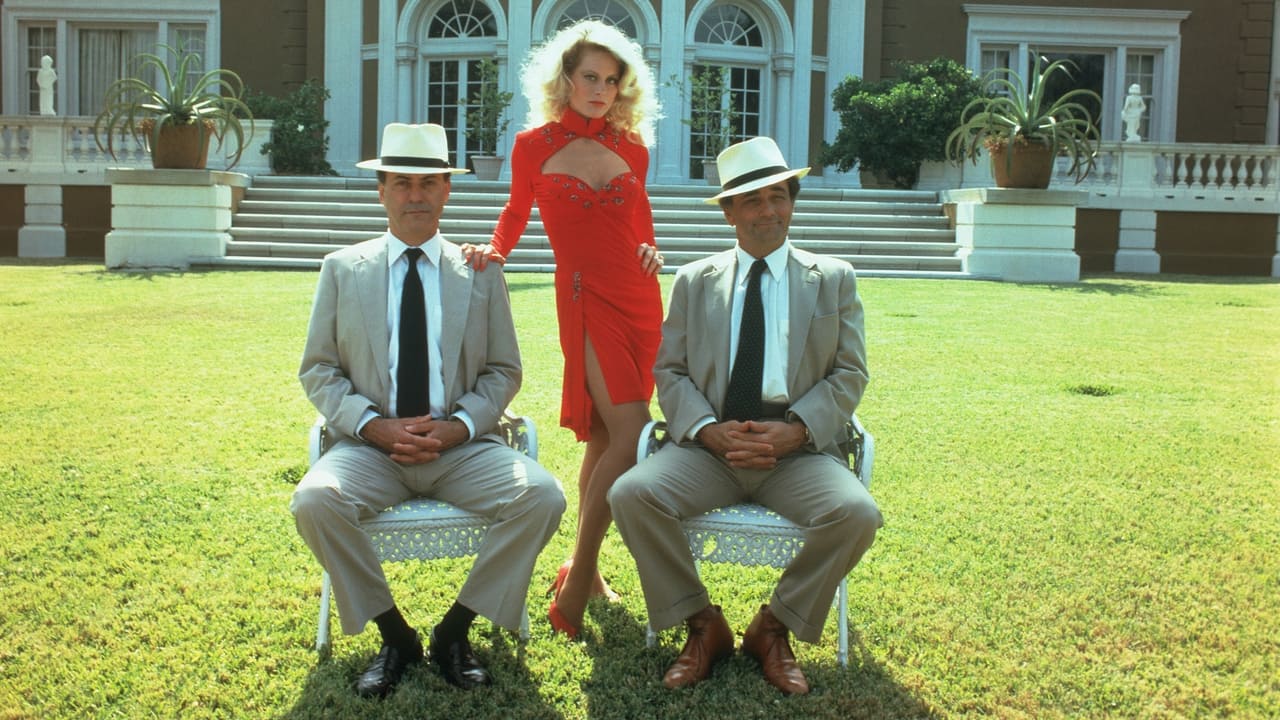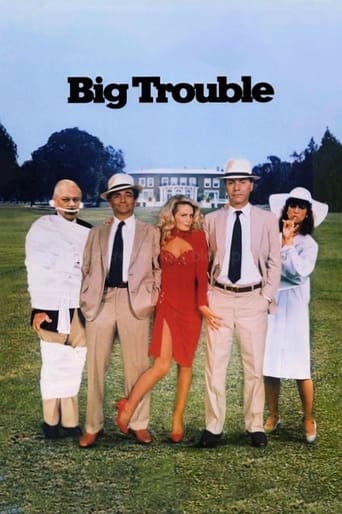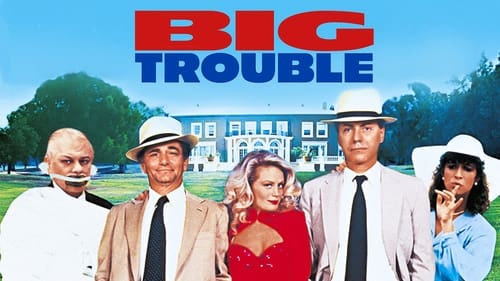


Very well executed
... View MoreThis is a must-see and one of the best documentaries - and films - of this year.
... View MoreAll of these films share one commonality, that being a kind of emotional center that humanizes a cast of monsters.
... View MoreThe film's masterful storytelling did its job. The message was clear. No need to overdo.
... View MoreLeonard Hoffman (Alan Arkin) is an insurance agent with a suburban family. His three sons all get accepted into Yale. His boss Winslow (Robert Stack) refuses to help him with any scholarships. His work mate is the hard-nosed O'Mara (Charles Durning). He goes on a sales call to the drunken rich trophy wife Blanche Rickey (Beverly D'Angelo). She complains about her gambler husband Steve Rickey (Peter Falk). Desperate for money to pay for his kids' college, he joins Blanche to murder her husband for the life insurance.This is the last film of John Cassavetes and he apparently hated it. The plot is so close to Double Indemnity that this is basically a spoof. Of course, none of it is funny because every moment of the movie, I'm asking if this is deliberate. It's hard to tell since Double Indemnity is not watched all the time. In order for a spoof to work, the audience must know all the beats in the original and what the filmmaker is doing to satire each moment for a joke. Then the last third of the movie goes bonkers. It becomes non-sense. The actors are trying for some wacky physical comedy despite the noir story. It's frustrating to watch a movie where the jokes don't work. One can see that everybody is trying but I don't understand what the film is trying to do.
... View MoreWriter-director Andrew Bergman and stars Peter Falk and Alan Arkin re-teamed after the success of their earlier collaboration The In-Laws with this misfire crime comedy.Arkin plays an insurance agent who has triplet sons who are about to leave for Yale. He's struggling to find the money to pay for it when along comes seductress Beverly D'Angelo, who wishes to take out a large life insurance policy on her dying husband (Peter Falk). She convinces Arkin to help push through the policy in exchange for a cut of the pay-off. Charles Durning plays a wily insurance investigator who knows something fishy is afoot.If this plot sounds familiar, this was meant as a take-off on Double Indemnity, although the second half goes off in a completely different direction. Columbia Pictures, which released this, ran into copyright trouble with Universal over the Indemnity similarities. Nice bet that Universal wouldn't notice the similarities, since they seem clueless about most of their classic catalog, but not Indemnity - so famous that even the suits at Universal knew the plot.This was the beginning of this film's troubles, as the title proved to be all too prophetic. Tensions on the set became unbearable, and Andrew Bergman quit the movie about halfway through filming, as well as his producing partner, resulting in this film having no credited producers. Falk contacted his old friend John Cassavetes, who reluctantly came onboard and directed the remainder of the film. In fact, this ended up being Cassavetes' final directing credit. This isn't very funny or very interesting, and the script problems are obvious fairly early on. The performers try, but they don't have much to work with. This was barely released to theaters.And what did Universal pictures get in return for the Columbia rehash of Double Indemnity? Columbia gave Universal an unused script they found inane and unworkable - a script titled "Back To the Future".
... View MoreAfter seeing a review of this film's best remembered sequence on Channel 5 news back in 1986 I went out to see it. It was fortunate, that I did because BIG TROUBLE did not have a long or successful movie box office run. And with some reason.In 1979, when Falk and Arkin made THE IN-LAWS, that film was just a tidal wave of fun. It seemed that movies had serendipitously put together two actors who played off each other very well. But no mutual property turned up to put them (hopefully with Richard Libertini again) through their paces. Then came BIG TROUBLE.It is funny at points, but it is also less amusing for some plot problems that did not occur in THE IN-LAWS. In the earlier film, Korpett (Arkin) was a successful, if timid (or staid), dentist living in suburbia. As such, his inter-involvement with his new in-law Ricardo (Falk) shakes the foundations of his entire world. A similar situation is in BIG TROUBLE, but it is more serious - for some reason - here. Leonard Hoffman (Arkin) is an insurance salesman for a firm owned by Winslow (Robert Stack) and serving under O'Mara (Charles Durning). He has a wife (Valerie Curtin) and three sons who are triplets, musical prodigies, and need to begin expensive education to enhance their musical career potentials. Arkin can't pay for all this. He makes a decent living, but not a really good one to support the triplets and their goals. He is constantly defeated by his bosses or by his timidity from getting the raises or promotions he deserves. He gets a call from a Mrs. Blanche Rickey (Beverly D'Angelo - the name, by the way, is a joke based on Baseball Team manager/owner BRANCH Rickey) to set an appointment to discuss life insurance with her and her husband Steve (Falk). Arkin goes and finds a suspicious set up but one that he has to accept.Falk's Steve Rickey is all smiles and agreements. He is the direct opposite of the negative Mr. Dietrichson in DOUBLE INDEMNITY, who is the husband slated for murder for profit by his wife Phyllis (Barbara Stanwyck) and salesman Walter Neff (Fred MacMurray). Falk is fully willing to sign a life insurance policy with Arkin's company that includes a double indemnity clause. This is unusual, but Arkin needs the commission because of his three sons. So he sells the unusually large policy. Within a week D'Angelo reports that Falk has died in an accident. Arkin rushes to see her at her lawyer's office, and meets the doctor (Libertini) as well as her bald headed, mustached lawyer. But a frightened Arkin realizes the lawyer is Rickey in disguise.Soon, though plots twists, Arkin finds himself tied to trying to get the policy paid off, despite heavy suspicions by Durning and Stack about it. The resolution of the insurance matter, Arkin's future with his job, and the heavy tuition of the three sons is at the conclusion of the film.Now, the issue in this film was that Arkin's character's financial and social situation was not firmly settled due to ensuing educational expenses that he could not afford. Hoffman is not as stable in his social role as Kornpett was. Instead the audience is sorry for Arkin's plight with his three sons and his no-where job, but because it is sorry the threat of Falk's plans is not as funny when they explode in Arkin's face. The resolution of THE IN-LAWS (a last minute rescue) was pretty good, but there was something slap-dash about the way BIG TROUBLE ended. Here the plotting of Falk and D'Angelo gets so out of hand that Durning is tied up and imprisoned for the last half hour of the film. It is by a sheer fluke at the end that things right themselves out. But the rushing through or stitching together of parts wrecked the conclusion.It is amusing at it's best moments (the Norwegian Sardine Liquor sequence was incredibly funny - and remains so: it was shown in that film review as a clip on Channel 5 by Stewart Klein the film critic). But few other moments were that funny. I would say it is worthy to look at, but THE IN-LAWS is far and away the better film.
... View MoreThis comedy according to Cineaste magazine was not directed by John Cassevettes but was lent his name after a young inexperienced director colleague of his fell into big...well, you know. This article went on to say that he was pretty grumpy on his deathbed knowing that this would be his last "credit". Well, that's a shame, because for a man who only made one comedy, a loopy one at that, this movie might have rounded out a legacy of angst, disillusionment and good old-fashioned middle-class American self-torture.If that last labyrinthian sentence did nothing to sway you then consider this: the supporting actresses Beverly D'Angelo and Valerie Curtin are quite funny, too, enough to make this silly and completely unimportant take on one American's attempt to "send the boys to Yale" worth a watch. There is an unusual amount of improv in certain scenes that actually give the movie a satirical bite, hey folks,I heard on the radio yesterday that 60% of all Americans have $4500 of debt or more! Anyone who's lost sleep wondering "where will I get that kind of money?" will relate to Big Trouble.
... View More